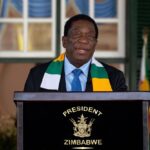Harare – Vice President Kembo Mohadi has informed President Emmerson Mnangagwa of his desire to retire from his position, multiple government sources have revealed to ZimLive, potentially triggering a significant reshuffle within the ruling Zanu-PF party and adding fuel to the already intense succession battles.
Mohadi, 75, has been battling increasingly debilitating health issues for several years, with sources indicating that the demands of his office have become too strenuous. His public appearances have been marred by alarming incidents, including at least three instances of collapsing. During his 18-day stint as acting president in January, while President Mnangagwa was on his annual leave, Mohadi made only one public appearance – a press conference where he was seated, and his voice repeatedly faded.
Speculation about Mohadi’s health intensified earlier this year after social media reports suggested he was seeking urgent medical treatment abroad, specifically in India. These claims followed previous incidents in 2024 where his health was called into question after he collapsed on multiple occasions.
Mohadi later addressed these speculations by holding an interview at his offices in Harare, dismissing claims that he was in India for medical attention. However, the persistent concerns about his health have continued to raise questions about his capacity to effectively perform his duties.
A source briefed on the developments stated, “He is spending more time indisposed than at work. He has made the decision himself that he wants to retire, and the president has accepted his decision. It’s now just a matter of timing how and when they make it official.”
Mohadi’s career has spanned various key government portfolios, including home affairs and state security minister, before his appointment as vice president in 2017. However, his tenure has also been marked by controversy.
In March 2021, he resigned in disgrace following the publication of voice recordings by ZimLive, which exposed a series of extramarital affairs, including with married women, one of whom was a state security agent whose husband was protecting both Mnangagwa and Mohadi at Munhumutapa. In the leaked recordings, Mohadi was heard arranging sexual encounters in his office and discussing the use of sex enhancers. He also allegedly attempted to solicit sex from a young woman whose tuition fees he had paid.
The main opposition MDC Alliance and several civic groups, including women’s rights organisations, had called for Mohadi’s resignation and an investigation into his conduct. The Women’s Academy for Leadership and Political Excellence (WALPE) celebrated his departure but insisted on an investigation to hold him accountable.
Despite initially denying the accusations and claiming they were part of a political plot, Mohadi apologised to Zimbabweans for “those tasks I failed to do well” while maintaining his innocence.
Mohadi’s potential departure would create a significant vacancy in the presidium, opening the door for a reshuffle and intensifying the already fierce competition for leadership within Zanu-PF.
Sources suggest that President Mnangagwa is considering appointing current Zimbabwe Defence Forces commander General Phillip Valerio Sibanda as Mohadi’s replacement. This move, if realised, would effectively pit Sibanda against the second vice president, Constantino Chiwenga, who is widely considered the frontrunner to succeed Mnangagwa as the next Zanu-PF leader.
If Mnangagwa grants Mohadi’s request to step down as Vice president, it is likely that he would be replaced by a former Zipra cadre, army general Philip Valerio Sibanda whose contract as Zimbabwe Defence Forces (ZDF) Commander was extended for 1 year is expiring on 24 December this year. Valerio had already been appointed a Zanu PF politburo member by Mnangagwa last year before the move was reversed after it made headlines as it was an illegal appointment since service chiefs are supposed to remain apolitical, (at least on paper).
Since currently Zanu PF is in violation of its own constition as both vice presidents are males, there is a very big chance that when Kembo steps down, the ruling party will still continue to violate its constitution.
Mnangagwa’s spokesman, George Charamba, declined to comment on the matter, further fueling speculation and intrigue surrounding the potential leadership changes.
The appointment of Sibanda as vice president would not only alter the power dynamics within Zanu-PF but also potentially reshape the succession landscape, setting the stage for a complex and potentially contentious battle for the party’s leadership in the years to come. The move could be interpreted as an attempt by Mnangagwa to strategically position his allies and consolidate his influence within the party, while simultaneously creating a counterbalance to Chiwenga’s ambitions.
The potential appointment of Sibanda has the potential to disrupt the established order within Zanu-PF and usher in a new era of political maneuvering and power struggles. The coming months are likely to be filled with intense lobbying, strategic alliances, and behind-the-scenes negotiations as various factions within the party jockey for position in anticipation of the upcoming leadership transition.
The situation is further complicated by the historical context of Zanu-PF’s internal dynamics, including the delicate balance between former ZANU and ZAPU factions following the 1987 Unity Accord. The appointment of a vice president from the ZIPRA cadre, the military wing of ZAPU during the liberation struggle, has been a long-standing tradition within the party. However, the current violation of this tradition, with both vice presidents being male, raises questions about the party’s commitment to its own constitution and the principles of inclusivity and representation.












